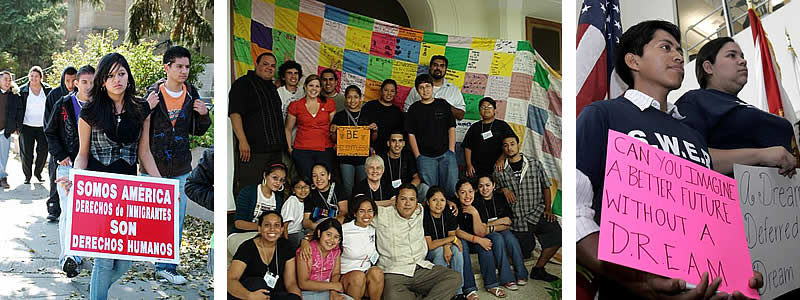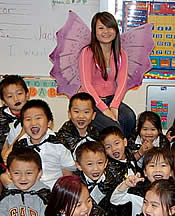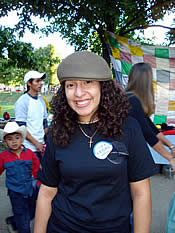
PROFILES
Jane Addams School for Democracy
St. Paul, MN
by Tommaso Verderame, 16, Y-Press
Like its namesake, the Jane Addams School for Democracy in St. Paul, MN, focuses on providing social and educational opportunities for those in need, primarily immigrant families adjusting to life in a new land. In particular, the school brings new immigrants and college students together to engage in conversation and work, based on the belief “that everyone is a teacher and everyone is a learner,” according to its Web site.
One of those students is Mai Emma Yang, a Community Engagement Scholar at the University of Minnesota who will graduate next semester. Mai has dedicated hundreds of hours to helping members of the St. Paul Hmong community, who come from various Southeast Asian countries. The Hmong, who had helped U.S. forces during the Vietnam War, had to flee their homeland after the Americans withdrew; about 100,000 now live in the United States.
While she was originally unsure what she wanted to pursue, Mai has discovered a passion for service through her work with the Hmong and plans to get a Master’s degree in social work. When asked what she enjoys most about her work, she said, “You never know what one little thing you do for someone will make such a big impact. I find impacting other people’s lives so rewarding.”
What would you say your biggest success with your work to date has been?
My biggest success is being a Hmong woman in the community and being among those with higher education. Because, in the Hmong culture, it’s usually male dominant, and so by being a Hmong woman who’s trying to change things, changing who we are as Hmong people, that is just very rewarding to me.
Do you have any special projects that you’re working on right now?
Right now, I am working on a translation between the words, the different terminology that we use. I’m taking a lot of phrases and words from 100 questions [garnered from a survey of Hmong] and I’m turning that into my own dictionary that can translate from Hmong to English, and English back to Hmong.
What advice would you give to other youth who want to get involved?
I would say to learn to keep your options open and to do lots of research, because you never know what you will come across, and you never know what you’ll find that you could be passionate about. I know that I switched majors three times, but now I know what I want to do with school. You just have to keep your options open because you never know what you can be and what you can do.
Latino Youth Collective
Indianapolis, IN
by Michelle Hu, 18, Y-Press
 Even though Cari Morales, 19, grew up in the United States, she speaks with a slight Hispanic accent, reflecting her fidelity to her heritage. Morales, who is studying business economics and public policy at the Kelley School of Business at Indiana University in Bloomington, still volunteers and takes action with an organization she joined back in high school – the Latino Youth Collective.
Even though Cari Morales, 19, grew up in the United States, she speaks with a slight Hispanic accent, reflecting her fidelity to her heritage. Morales, who is studying business economics and public policy at the Kelley School of Business at Indiana University in Bloomington, still volunteers and takes action with an organization she joined back in high school – the Latino Youth Collective.
What was once the El Puente project, an initiative to provide emotional support and resources for Latino youth in Indianapolis, the Latino Youth Collective has evolved into much more. In high school, Morales often organized meetings during which college professors would speak to youth about community development and immigration laws. As time went on, she participated in LYC’s most ambitious project: documentaries. Produced mainly by youth, these short videos aim to spread awareness about the Latino community.
“It’s amazing really because these documentaries are produced by people ages from 11 years old to 30,” Morales said.
In all of her involvement with the LYC, Morales said learning how to use media and technology properly has been the most significant lesson. “It’s like a blessing really for what we can do with the media,” she said. In her opinion, the future of immigration reform lies in the ability of youth to spread the word through different methods.
Are you able to balance your studies with activism?
Oh yeah. For example, yesterday we just had a presentation about the DREAM Act, and people from Indianapolis came to IU to present. I think youth should get involved in the DREAM Act, but more so to spread awareness among other cultures and not just Latinos.
Do you think that youth should get more involved with immigration activism?
I think youth should do whatever they set their minds to. If they have a problem with something in the community and they see a need to change, they need to take action for it. Before they do that, they need to become more educated.
What does immigration reform mean to you?
Fixing our current system. It means trying to make change and trying to avoid these terms put out by media, like illegal immigrants or undocumented immigrants. It’s the land of the free, land of opportunity. It’s about equality, right?
League of United Latin American Citizens
Longmont, CO Chapter
by Rebekah Taft, 18, Y-Press
Though it’s been almost a decade since she graduated, Sonia Marquez still leaves quite a mark on the many Hispanic youth at Skyline High School. Through a League of United Latin American Citizens chapter at the Colorado school, Marquez, 27, meets with at-risk Latino youth, giving them guidance and encouragement to develop projects that line up with their interests.
 Founded in 1929, LULAC is the United States’ oldest and largest Latino organization, with member groups throughout the country. One of the projects tackled by the Longmont student chapter was a rally for immigration reform in March. Preparations for the rally, initiated by LULAC students and sponsored by Reform Immigration for America, involved months of training. Marquez acted as a guide for the students by providing instruction on everything from how to speak to business leaders to how to write a press release. The hard work paid off: More than 200 people attended, and response was overwhelmingly positive.
Founded in 1929, LULAC is the United States’ oldest and largest Latino organization, with member groups throughout the country. One of the projects tackled by the Longmont student chapter was a rally for immigration reform in March. Preparations for the rally, initiated by LULAC students and sponsored by Reform Immigration for America, involved months of training. Marquez acted as a guide for the students by providing instruction on everything from how to speak to business leaders to how to write a press release. The hard work paid off: More than 200 people attended, and response was overwhelmingly positive.
Marquez recognizes that what Latino youth need in order to change immigration policy is empowerment. She sees herself as a catalyst in the process, a person who gives students the initial tools for success so that they may thrive on their own. Marquez believes that the combination of adult mentors and passionate youth is what truly makes reform happen.
What inspired you to work with LULAC?
The students. I'm really passionate with youth because many of them do not have people in their lives who take the time to give them opportunities to get outside of their comfort zone, to get outside of their community and see what's going on in other communities. I am passionate about trying to provide them with those opportunities.
I got involved in a youth program when I was 14 years old, and at that age, I was really lost. I didn't know who I was. I was trying to be in this little gang role, because I was was around a gangster crowd. That's what I was taking in and that's all I knew and that's what influenced me. But when I became involved with my youth group, they helped me realize the importance of my culture and about myself, and they provided me with amazing opportunities.
What was some of the best advice you received while working with the students?
Preparing for the rally, we were so nervous because it was the first time we had ever done a student-led movement in Longmont. There had never been a march or a rally for immigration reform. So we felt nervous about a lot of different things. But when I was told, "Remember why you're doing this, remember who you're doing this for and know that it's not gonna be perfect," it relieved a lot of stress for me.
If you could talk to the president about any issue involving immigration reform, what would it be?
I would talk to him about the DREAM Act and how important it is to pass for the future of our immigrant youth. They came here at a young age, as children, without a choice. They were brought here and were raised here as Americans. They go to school here, they get good grades here, they become involved in sports here. And then once it's time to graduate, they have to pay the out-of-state tuition, and that's really not an option for many of them.
It's so important that this DREAM Act gets passed because it will give these youth a chance to continue their higher education, go to college, become something. And it'll offer them a path to citizenship, which they deserve.




